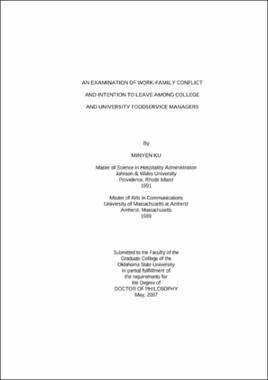| dc.contributor.advisor | Ryan, Bill | |
| dc.contributor.author | Ku, Minyen | |
| dc.date.accessioned | 2013-11-26T08:33:23Z | |
| dc.date.available | 2013-11-26T08:33:23Z | |
| dc.date.issued | 2007-05 | |
| dc.identifier.uri | https://hdl.handle.net/11244/7242 | |
| dc.description.abstract | Findings and Conclusions: | |
| dc.description.abstract | The primary purpose in the present study was to explore if there were relationships between pay satisfaction, work scheduling, role conflict, role ambiguity, work-family conflict (WFC) and intention to leave, in the college and university foodservice industry. In general, there were significant and positive relationships between these studied variables except pay satisfaction. | |
| dc.description.abstract | The results indicated that the respondents who experienced WFC also encountered role conflict and role ambiguity. Based on prior research it was anticipated that WFC occurs when one's work-related role interferes with his/her family demands and is accentuated by job-related role stress; therefore, WFC can potentially interfere with several work-related role stressors, such as role conflict and role ambiguity. In order to minimize "Role Ambiguity" the managers might experience, there is a need to re-examine the appropriate work hours required in their jobs. | |
| dc.description.abstract | The total number of hours worked during weekdays and hours worked during weekends monthly were found to be related to behavioral, time, strain-based interference from work, and intention to leave. Since role conflict and role ambiguity were important factors in increasing the probability that college and university foodservice managers will experience WFC and may have a desire to leave the current job, the managers should be assured that each role occupant has sufficient information to carry out his or her job successfully and that the expectations given to a role occupant do not create incompatible behaviors in the same job. | |
| dc.description.abstract | This study provides information regarding the factors which are related to college and university foodservice managers' intention to leave the current job and the information generated can help administrators better understand the need to take preventive or correctional actions to adjust the factors that trigger the chain of psychological states that lead to intention to leave. | |
| dc.format | application/pdf | |
| dc.language | en_US | |
| dc.rights | Copyright is held by the author who has granted the Oklahoma State University Library the non-exclusive right to share this material in its institutional repository. Contact Digital Library Services at lib-dls@okstate.edu or 405-744-9161 for the permission policy on the use, reproduction or distribution of this material. | |
| dc.title | Examination of work-family conflict and intention to leave among college and university foodservice managers | |
| dc.contributor.committeeMember | Leong, Jerrold K. | |
| dc.contributor.committeeMember | Hu, Bo | |
| dc.contributor.committeeMember | Nolan, Robert | |
| osu.filename | Ku_okstate_0664D_2282 | |
| osu.accesstype | Open Access | |
| dc.type.genre | Dissertation | |
| dc.type.material | Text | |
| thesis.degree.discipline | Hotel and Restaurant Administration | |
| thesis.degree.grantor | Oklahoma State University | |
